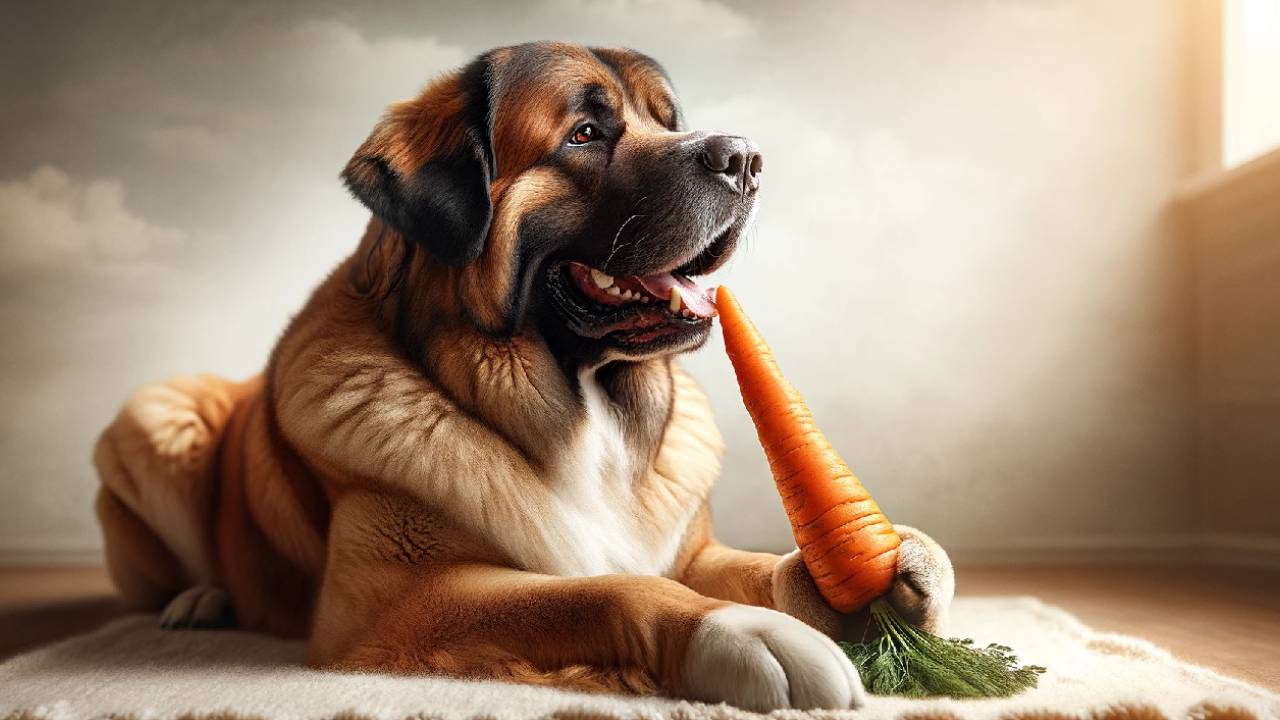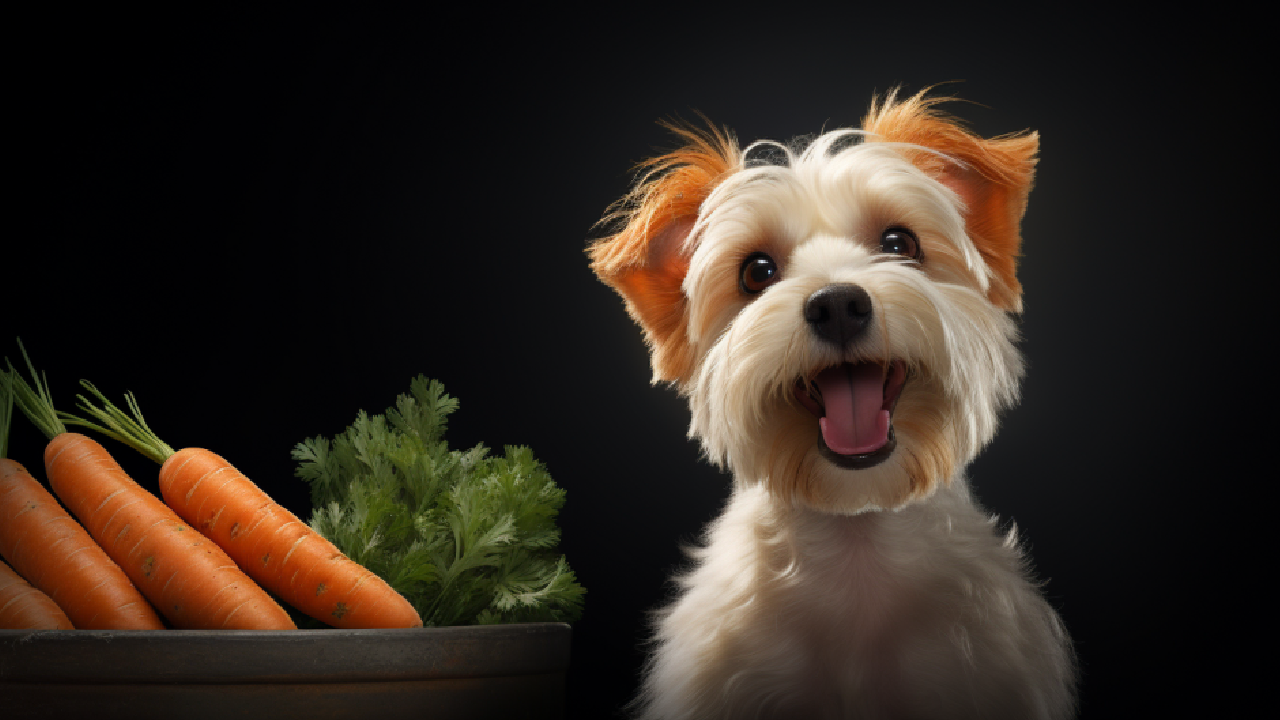Yes, dogs can eat carrots! These crunchy vegetables offer several benefits, including weight management, vitamins, minerals, and antioxidants. However, it’s crucial to be cautious with portion sizes and cut them into safe, bite-sized pieces to prevent choking, especially for smaller breeds.
This article will further explore the advantages and precautions of feeding carrots to your dog, ensuring their safety and well-being while enjoying this nutritious treat.
Health Benefits of Carrots for Dogs
Carrots offer a plethora of health advantages for your canine companion. Including these crunchy delights in your dog’s diet can improve their overall well-being. Here are some key benefits:
Vitamin A Boost
Carrots are a fantastic source of vitamin A, an essential nutrient that supports your dog’s vision health. Adequate vitamin A intake helps maintain good eyesight, especially in dim light conditions.
Bone Health
Loaded with vitamin K, carrots play a role in promoting strong and healthy bones. This is particularly beneficial for growing puppies and seniors prone to bone-related issues.
Immune System Support
Vitamin C in carrots is a natural antioxidant that boosts your dog’s immune system. A robust immune system helps your furry friend fend off infections and illnesses.
Dental Care
The crunchy texture of carrots provides a natural abrasive action against your dog’s teeth, helping to reduce plaque buildup and maintain better oral hygiene.
Digestive Aid
Carrots are a great source of dietary fiber, which aids in digestion and can alleviate constipation in dogs. The fiber content supports a healthy gut and smoother bowel movements.
Low-Calorie Treat
If you’re concerned about your dog’s weight, carrots make an excellent low-calorie treat option. They provide a satisfying crunch without adding excess calories to your pet’s diet.
Healthy Skin
The vitamins and antioxidants in carrots can contribute to healthy skin and a shiny coat for your furry friend. This is particularly noticeable in dogs with skin sensitivities or dull coats.

Are Carrots Good or Bad for Dogs?
The verdict is overwhelmingly positive regarding incorporating carrots into your dog’s diet. Carrots are generally considered safe and offer a range of health benefits for your furry friend. However, like any dietary addition, it’s essential to be aware of certain factors to ensure your dog’s well-being.
The Good:
- Nutrient Powerhouse: Carrots are packed with essential vitamins and minerals to improve your dog’s health. Carrots provide a well-rounded nutritional boost from vitamins A, K, and C to potassium and fiber.
- Weight Management: As a low-calorie treat option, carrots can be a helpful addition to dogs’ diets, particularly those who need to shed a few pounds or maintain a healthy weight.
- Dental Health: The natural crunchiness of carrots helps scrape off plaque from your dog’s teeth, promoting better oral health. Chewing on carrots can be a natural way to maintain clean teeth and gums.
- Digestive Aid: The fiber content in carrots can aid digestion and regulate bowel movements, helping prevent constipation and promoting a healthy gut.
The Considerations:
Portion Control
While carrots are beneficial, moderation is key. Feeding too many carrots at once can lead to digestive upset, including diarrhea. Introduce carrots gradually to allow your dog’s digestive system to adjust.
Choking Hazard
Ensure that carrots are cut into appropriately sized pieces to avoid choking hazards, especially for smaller dogs or those prone to gulping food.
Allergies
Just like with any new food, there’s a slight possibility of allergies. Watch out for signs such as itching, hives, or gastrointestinal distress after introducing carrots.
Sugar Content
Carrots contain natural sugars, which are usually not a concern in small amounts. However, if your dog has diabetes or any blood sugar regulation issues, consult your vet before adding carrots to their diet.
Whole vs. Cooked
While dogs can enjoy raw and cooked carrots, some might find cooked carrots easier to digest. Pay attention to how your dog reacts to different.

How to Serve Carrots to Dog
Introducing carrots into your dog’s diet can be a delightful and rewarding experience, provided you follow a few simple guidelines to ensure their safety and enjoyment.
- Preparation and Size
Start washing the carrots thoroughly to remove any dirt or residues. Depending on the size of your dog, choose an appropriate carrot size. Consider baby carrots or cut regular carrots into smaller, manageable pieces for small breeds.
- Cutting Techniques
To prevent choking hazards, cut carrots into bite-sized portions. Thin, round slices or small sticks are recommended. Avoid large chunks that might be difficult for your dog to chew or swallow.
- Training and Treats
Use carrot pieces as training treats or rewards during training sessions. The natural sweetness of carrots can be motivating for your dog. Just be sure to account for the calories from carrots in your dog’s overall daily intake.
- Incorporation in Meals
Add chopped or grated carrots to your dog’s regular meals. This can boost nutrients and introduce some variety into their diet.
- Avoid Flavorings
While plain carrots are great, avoid adding seasonings, salt, or oils. These additives can be harmful to your dog’s health.
- Monitor Digestive Response
As with any new food, watch how your dog responds to carrots. Introduce them gradually to monitor adverse reactions such as stomach upset or allergies.
What To Do If Your Dog Eat Carrot?
Suppose your dog has come in contact with a carrot, whether a nibble or a curious exploration. There’s typically no need to panic. Carrots are generally safe for dogs and rarely cause serious issues. However, here’s what you should consider:
- Monitor for Allergic Reactions: Keep an eye on your dog for any signs of allergic reactions, such as itching, hives, or excessive licking. While rare, dogs can have sensitivities to certain foods, including carrots.
- Watch for Digestive Upset: If your dog consumed a larger piece of carrot or had an excessive amount, monitor for any signs of digestive upset, like vomiting, diarrhea, or discomfort.
- Hydration: If your dog consumes a lot of carrots, ensure they have access to fresh water. Carrots have a high water content, and additional hydration can help maintain balance.
- Contact Your Veterinarian: If you notice persistent symptoms like severe vomiting, diarrhea, or signs of distress, it’s best to contact your veterinarian. They can provide guidance based on your dog’s specific situation.
- Consider All Ingredients: If the carrot was part of a larger dish or recipe, ensure there were no other ingredients that could harm dogs, such as spices, flavorings, or seasonings.
Conclusion
Carrots can be an excellent and nutritious addition to your dog’s diet in moderation. Their vitamins, minerals, and fiber content provide numerous health benefits. Before making any dietary changes for your furry friend, consult your vet and introduce new foods slowly and appropriately. Doing so ensures that your dog enjoys the goodness of carrots while maintaining their overall well-being.

FAQs
Can I give my dog baby carrots?
Baby carrots are safe for dogs to prevent choking if cut into appropriate sizes.
Are cooked carrots better for dogs?
Cooked carrots can be easier for some dogs to digest, but raw carrots offer more crunch and dental benefits.
How many carrots can I give my dog in a day?
Portion control is essential. As a general guideline, small dogs can have around 1-2 baby carrots, while larger dogs can have a couple of regular carrots daily.
Сan I freeze carrots for my dog?
Yes, dogs can eat frozen carrots. Freezing carrots is a convenient way to offer your dog a cool and crunchy treat, especially on a hot day. Frozen carrots can be a refreshing and nutritious snack for your furry friend.
Are there any alternatives to carrots for my dog’s health?
Other dog-friendly fruits and vegetables include sweet potatoes, apples, and green beans. Always introduce new foods gradually and observe your dog’s reactions.
Can dogs with diabetes eat carrots?
Carrots contain natural sugars, so monitoring your dog’s blood sugar levels is essential if they have diabetes. Consult your vet for personalized advice.






I imagine my little dog gnawing on a carrot😂😂😂